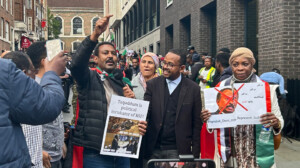Khartoum-Port Sudan highway paralysed by protestors
Eastern Sudan faces widespread unrest and disruption, including the 3-day blockage of the Khartoum-Port Sudan highway, in the absence of an official reaction to the demands of protestors.
 Khartoum-Port Sudan highway is blocked by protestors on July 28, 2020 (Social media)
Khartoum-Port Sudan highway is blocked by protestors on July 28, 2020 (Social media)
Eastern Sudan faces widespread unrest and disruption, including the 3-day blockage of the Khartoum-Port Sudan highway, in the absence of an official reaction to the demands of protestors.
On Sunday, protesters closed the Khartoum-Port Sudan highway near Sinkat in Red Sea state for four hours. On Monday, they blocked the highway again, this time with logs and rocks.
Yesterday, the Khartoum-Port Sudan highway witnessed complete paralysis, with hundreds of lorries and public transport vehicles lined up on both sides of the road.
The High Council of Beja Nazirs* and Independent Chieftains conditioned the opening of the road with an official response to the demands they submitted to the Sovereign Council and the Cabinet.
Journalist Osman Hashim told Radio Dabanga that protesters in Sinkat handed a memorandum to the new Red Sea governor, Abdallah Shangarai, during his return to Port Sudan.
The memo holds demands related to the eastern track, negotiated during the peace talks in Juba and the appointment of Saleh Ammar and Suleiman Ali as civilian governors in Kassala and El Gedaref, respectively.
The High Council has given the government 72 hours to respond to the demands. Beja chiefs say they will opt for self-determination for eastern Sudan (Red Sea state, Kassala, and El Gedaref) in the event the demands are rejected.
In Kassala, protesters closed a number of government institutions and ministries on Tuesday to protest against the appointment of the new governor.
State government employees told Radio Dabanga that the protesters came to the ministries and asked them to leave their offices.
The protesters closed one of the two bridges over the El Gash river in the town for vehicles and only allowed pedestrians to pass. It was opened again in the evening, after intervention of Nazir Sayed Tirik.
Activist delegation to Khartoum
In Khartoum, members of the Sovereign Council, Gen Shamseldin Kabashi and Mohamed El Faki, met with a delegation of eastern Sudanese civil society activists in the presence of the Ministers of Justice and Defence.
Ahmed Abusin, Nazir of the El Shukriya tribe added that the meeting “reached an understanding concerning all differences of opinion, and this will be discussed in detail in a consultative dialogue after the Eid El Adha”.
According to Ali Hasan, Secretary General of the Northern Entity in Kassala, the meeting took place at the invitation of the Sovereign Council.
During the meeting, it was agreed to have another meeting with all stakeholders present after Eid El Adha (Muslim Feast of the Sacrifice that will commence on Friday). Hasan said the meeting will discuss “the matters of eastern Sudan in full transparency and frankness to find satisfactory solutions to all issues of concern” in a press statement yesterday.
Eastern Sudan track
A committee was established on July 5 to re-discuss the eastern Sudan track of the peace negotiations “to resolve the disputes resulting from a lack of coordination and consultation on the track,” eastern Sudanese Nazir Mohamed Tirik said in a press statement in Khartoum.
The decision to form this committee was made by Sovereign Council member Lt Gen Shamseldin Kabashi, Nazir Mohamed Tirik of the Hadendawa tribes, and Mousa Mohamed Ahmed, head of the Eastern Front, who had a meeting at the Republican Palace in Khartoum yesterday.
The committee will include members of the Sovereign Council, the Council of Ministers, the Forces for Freedom and Change, the Higher Council of Eastern Sudanese Nazirs, political parties, and factions of the Beja Congress.
“The committee is to lay the foundations that will push the peace process in eastern Sudan in the right direction, by building a consensus between all stakeholders in the east. It will ensure peace and stability in the country in general, and in eastern Sudan in particular,” Nazir Tirik said.
An agreement on the eastern Sudan track has already been reached in February.
* A nazir is a state-appointed administrative chief of a tribe, according to the native administration system in Sudan
Radio Dabanga’s editorial independence means that we can continue to provide factual updates about political developments to Sudanese and international actors, educate people about how to avoid outbreaks of infectious diseases, and provide a window to the world for those in all corners of Sudan. Support Radio Dabanga for as little as €2.50, the equivalent of a cup of coffee.












 and then
and then